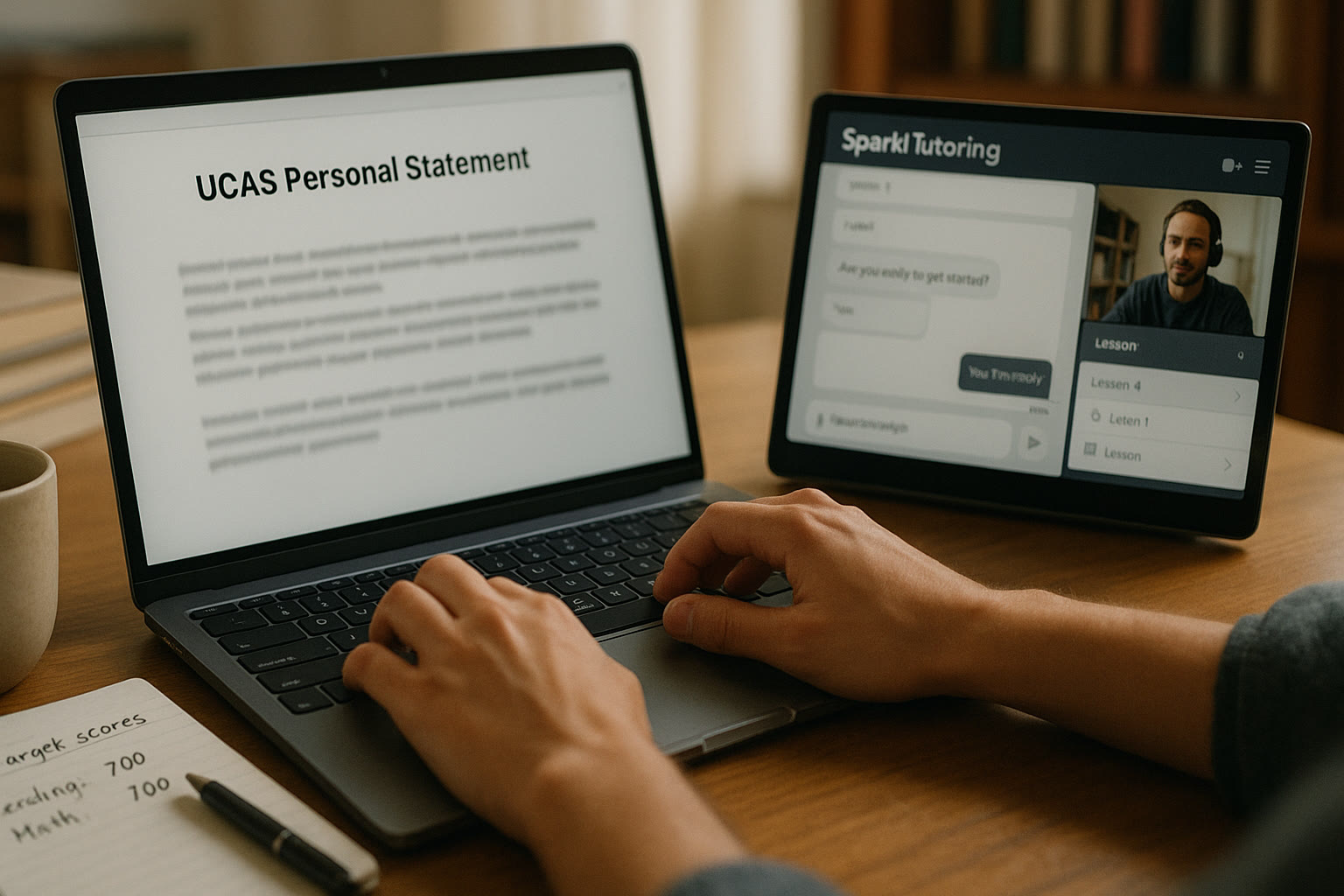Opening the Door: Why the SAT Still Matters for UK Applications
Thinking about applying to a UK university with an SAT score? Good news: the SAT can be a powerful asset in your application toolkit. While the United Kingdom’s main admission system — UCAS — doesn’t require a single standardized test like the SAT, many competitive UK programs (especially in the sciences, engineering, and some US-style programs) welcome or even recommend standardized test scores from international applicants to contextualize academic readiness. The College Board and BigFuture encourage students to use SAT scores strategically when applying overseas, and colleges will often accept or consider them as evidence of academic preparedness for international applicants. ([bigfuture.collegeboard.org]( Idea : A student and parent at a kitchen table with a laptop open to the UCAS dashboard, SAT prep books stacked nearby, looking reassured and focused.
Before You Start: Know the Basics
1. UCAS is the gateway — but schools set the rules
All UK undergraduate applications route through UCAS (Universities and Colleges Admissions Service), where you submit up to five choices, your personal statement, predicted grades, and references. Importantly, each university and program has its own admissions criteria. That means some institutions may directly list SAT or other international test score ranges they accept, while others may not mention them but will still accept scores as part of a wider dossier.
The College Board explains that colleges decide how to use SAT scores — the College Board does not dictate that policy. For international applicants, SAT scores often supplement other measures like international curricula (IB, APs, A-level equivalents), predicted grades, and the personal statement. ([satsuite.collegeboard.org]( Digital SAT: what to remember
The SAT is now delivered in a digital format, shorter and adaptive in structure, with free official practice available online. If you plan to use your Digital SAT for UK applications, be sure to register in time and keep an eye on score release timelines so your results arrive before UCAS deadlines (or university-specific deadlines if you apply early). BigFuture and the SAT Suite sites provide up-to-date registration and timing details. ([satsuite.collegeboard.org]( Roadmap: From Prep to Application
Step 1 — Research and make a college list
Start with program fit: check curricula, module structure, internship opportunities, and the university’s stance on international tests. Use BigFuture to build a college list and track requirements — many UK schools will state whether they accept SAT scores for international students or if they prefer other credentials. Remember to mix reach, match, and safety choices.
Step 2 — Set your target SAT score
Pick a target score based on past admitted student averages (when available) and the score ranges universities mention for international applicants. If a school doesn’t list SAT ranges, use comparable indicators — such as average admitted student profiles or the SAT-equivalent conversions for A-levels/IB where available — as a guide. And if you’re unsure whether to submit scores, BigFuture suggests submitting if your scores strengthen your application. ([bigfuture.collegeboard.org]( 3 — Plan tests and timeline
Work backward from UCAS deadlines: the main UCAS deadline falls in mid-January for most courses, with an early deadline (usually October 15) for Oxford, Cambridge and many clinical courses. Make sure you schedule your SAT early enough so official scores can be sent before these deadlines. If your scores aren’t ready, indicate in your application that they are forthcoming and provide expected test dates.
Step 4 — Prep smart: quality over quantity
Focused, high-quality practice beats blind repetition. Use free official practice resources, timed digital practice, and targeted review of problem areas. Consider a blended approach: independent practice plus periodic one-on-one coaching to refine strategies, pacing, and test-day readiness. That’s where services like Sparkl’s personalized tutoring can fit naturally — 1-on-1 guidance, tailored study plans, expert tutors, and AI-driven insights help you identify weaknesses quickly and make measurable gains without wasted time.
Writing the Personal Statement: Let SAT Be a Supporting Actor
The UCAS personal statement is the heart of your UK application. Admissions tutors want to see intellectual curiosity, subject passion, and evidence of commitment to the field. SAT scores are numerical evidence; they support but don’t replace a compelling narrative.
- Use your statement to explain what draws you to the subject (courses, projects, books).
- Include specific examples — labs, competitions, research, internships, or independent projects.
- If your educational path had gaps or differences (e.g., switching curricula), briefly explain contextually.
- Save the SAT discussion for a single, factual line: for example, “I achieved a Digital SAT score of XXXX, which helped me gauge my readiness for the analytical demands of X course.”
How to Report SAT Scores to UK Universities
When you register with the College Board, you can send official SAT score reports directly to institutions. For UK universities, check whether they prefer scores submitted through College Board, uploaded via UCAS, or stated on your application. The College Board’s Student Search Service and BigFuture tools also help international students connect with participating institutions and scholarship opportunities. Opting into Student Search can introduce you to programs that actively seek international applicants with SAT scores. ([satsuite.collegeboard.org]( Reporting Options and Practical Tips
- Send official reports early: if you have a firm deadline (Oxbridge, medicine), send scores as soon as they’re released.
- Self-report scores on UCAS if asked, but double-check the university’s policy on accepting self-reported vs. official scores.
- If a university requests a conversion (SAT → A-level equivalence), consult the admissions office — many will provide guidance.
When to Submit (Deadlines and Timing Table)
Below is a simple timing table to help you plan test dates, score reporting, and UCAS submission. Always verify exact dates with UCAS and the universities you apply to, because some programs (and some colleges) have earlier internal deadlines.
| Action | Recommended Timeline | Why it matters |
|---|---|---|
| Take Digital SAT (final attempt) | By October–November of your final year | Ensures scores arrive before UCAS January deadline and gives time for a retake if needed. |
| Send official SAT reports | Immediately after scores release | Some UK programs review materials as they arrive; late reports can disadvantage you. |
| Submit UCAS application (main deadline) | Mid-January (varies by year) | Most courses have this deadline; check UCAS for exact date each year. |
| Oxbridge/Medicine/Veterinary deadline | Normally October 15 | These programs have earlier deadlines and may require additional tests/interviews. |
Using SATs for Scholarships and Financial Aid
Some UK universities and external scholarship programs consider standardized test scores when evaluating international applicants for merit awards. Additionally, the College Board’s Student Search Service can connect you with scholarship opportunities. If scholarships are a goal, submitting strong SAT scores can strengthen your case — especially where universities compare international applicants using mixed credential systems. ([bigfuture.collegeboard.org]( & Real-World Scenarios
Example 1 — Engineering Applicant from the U.S.
Sara is applying to a mechanical engineering program in the UK. Her school uses Advanced Placement (AP) classes and she takes the Digital SAT in September, scoring high on Math. She uploads official scores and highlights in her personal statement an independent robotics project. The combination of APs, strong SAT math, and project work creates a coherent story of preparation.
Example 2 — Humanities Applicant Looking to Stand Out
David applies for English Literature and earns competitive reading and writing scores on the SAT. He pairs that with essays, literary analyses, and a small portfolio of creative writing. For arts and humanities, the SAT can demonstrate analytical reading and writing readiness that complements the qualitative evidence in his application.
Common Questions from Students and Parents
- Do all UK universities accept SATs? Not necessarily — while many accept or consider them, policies vary. Always check each program’s international admission pages.
- Should I take SAT Subject Tests? Subject Tests have been discontinued by College Board; instead, use AP scores or other subject-based credentials if the program asks for subject proof.
- Can I apply without SATs? Yes. Many applicants use A-levels, IB, APs, or national credentials. If your other credentials are strong, SATs may be optional.
How to Make Your Application Shine — Beyond Scores
Admissions tutors read applications holistically. Here’s how to build a strong package:
- Curate a focused personal statement that shows depth, not breadth.
- Secure thoughtful references that speak to your academic potential in your chosen subject.
- Show evidence of relevant experience — lab work, volunteer roles, internships, or subject competitions.
- Consider demonstrating broader skills: coding projects, portfolios, or research summaries if relevant.
If you’d like tailored help shaping this narrative, Sparkl’s personalized tutoring offers expert tutors who can help craft a stronger statement, connect SAT strategies to your academic story, and provide AI-driven insights to track progress effectively.
Checklists: What to Submit with UCAS (International Applicant Focus)
- UCAS application form with up to five choices
- Personal statement (subject-focused)
- Reference (usually from a teacher or counselor)
- Predicted grades (from school)
- Official test scores (AP, SAT, TOEFL/IELTS if required)
- Any portfolio items or supplementary materials required by the program
- Proof of English proficiency if your schooling wasn’t in English
Practical Tips: Making Time, Money, and Stress Work for You
- Start early: research and test planning are time investments that reduce stress later.
- Budget for score reports: sending official reports costs money, so prioritize where you send them.
- Use official free practice (College Board, BigFuture) for targeted practice; self-study plus occasional 1-on-1 sessions is often the most cost-effective prep route.
- Keep documentation organized — transcripts, passports, test confirmations, and any required translations.
When to Ask for Help — and Who to Ask
If you’re unsure whether to submit SAT scores, or how to frame them in your personal statement, ask your school counselor or contact the university admissions office directly. If you want more structured, measurable improvement in a compact timeframe, consider personalized tutoring: Sparkl’s 1-on-1 tutors create tailored study plans, give practice under test-like conditions, and apply AI-driven insights to target weak spots quickly — ideal when applying to competitive UK programs that want clear evidence of academic readiness.
Final Thoughts: Think of the SAT as Part of a Story
Applying to UK universities with SAT scores is less about the single number and more about the story that number helps you tell. The SAT can clarify your readiness, especially in an international context where admissions teams compare varied curricula. Pair a strong SAT result with a focused personal statement, meaningful references, and relevant subject experiences to give admissions tutors a coherent, compelling picture.
Take calm, deliberate steps: research each program’s policies, schedule tests with time for retakes, and build an application that connects your SAT performance to your academic goals. And when you need help turning practice into progress, consider one-on-one, personalized support that keeps you efficient and confident.

Quick Resources to Remember
- Check UCAS and each university’s international admissions pages for official policies and deadlines.
- Use College Board / BigFuture for Digital SAT dates, practice, and score-reporting options.
- Consider Student Search Service to find scholarship opportunities and institutions that seek international applicants.
Good luck — and know that the path to the UK can be clear, practical, and even exciting when you break it into manageable steps. If you’d like personalized help plotting that path, Sparkl’s tutors are ready to help students and families turn goals into a plan and a score that tells the story you want admissions tutors to read.
— End of Guide —












No Comments
Leave a comment Cancel